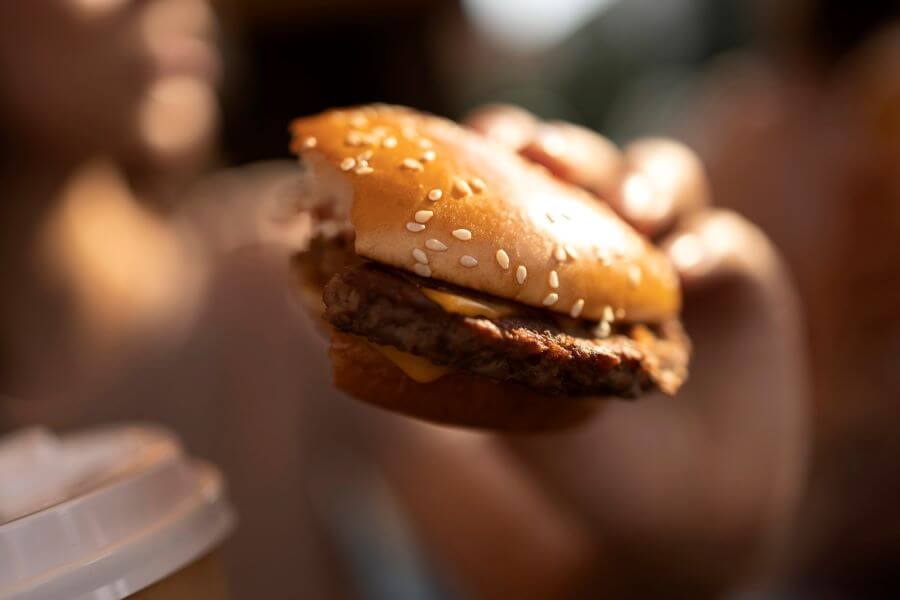The Breakfast Revolution at McDonald’s
Unveiling All-Day Breakfast: A Game-Changer in Fast Food
The launch of McDonald’s All-Day Breakfast in October 2015 marked a significant shift in the fast-food industry. Until then, breakfast items were typically limited to morning hours, constrained by operational considerations and traditional mealtime norms. McDonald’s decision to offer breakfast throughout the day was a response to growing customer demand for flexible dining options and represented a bold move in an industry characterized by rigid menu structures.
Historical Context: McDonald’s Breakfast Offerings Over the Years

McDonald’s has a long history with breakfast. The company introduced its first breakfast item, the Egg McMuffin, in 1972, revolutionizing fast food by offering a quick and easy morning meal option. Over the years, McDonald’s expanded its breakfast menu to include a variety of items, from hotcakes to breakfast burritos. However, these items were traditionally served only until 10:30 am, leaving many breakfast-loving customers longing for more flexibility.
Customer Demand and Industry Response
Analyzing the Rise in Customer Demand for All-Day Breakfast
Customer demand for all-day breakfast had been growing for years before McDonald’s finally made the move. With changing work schedules and lifestyle habits, the lines between traditional mealtimes have blurred, leading to a rise in demand for flexible dining options. By offering All-Day Breakfast, McDonald’s tapped into this trend, meeting customer demand while differentiating itself from competitors.
Fast Food Competitors: How McDonald’s Sparked a Trend
McDonald’s introduction of All-Day Breakfast sparked a trend in the fast-food industry. Recognizing the success of McDonald’s initiative, other fast-food chains, such as Burger King and Wendy’s, began expanding their own breakfast offerings and serving hours. This industry-wide shift towards flexible breakfast service is a testament to the influence of McDonald’s on fast food culture.
Menu Engineering: Adapting Favorites for All-Day Consumption
The Engineering Challenge: Making Breakfast Items All-Day Ready
Adapting breakfast items for all-day consumption presented numerous challenges. Many breakfast items, such as McMuffins and hotcakes, require different cooking equipment and temperatures than other menu items. To overcome these challenges, McDonald’s had to rethink its kitchen operations, investing in new equipment and training staff to ensure efficient preparation of breakfast items throughout the day.
The Resurgence of Classics: Egg McMuffins Throughout the Day
The All-Day Breakfast menu brought a resurgence in popularity for classic items like the Egg McMuffin. Once confined to early morning hours, these items could now be enjoyed at any time of day, attracting both traditional breakfast eaters and those seeking non-traditional meal options. This broadened appeal contributed to increased sales and customer satisfaction.
The Logistics of All-Day Breakfast Implementation
Behind the Scenes: How McDonald’s Managed Operational Changes
Implementing All-Day Breakfast required significant operational changes. McDonald’s had to adapt its kitchen layout and workflows to accommodate the extended availability of breakfast items. This involved reorganizing cooking stations, adjusting staff schedules, and streamlining processes to ensure smooth service during all operating hours.
Supply Chain Adjustments: Ensuring Availability of Breakfast Ingredients
Ensuring the constant availability of breakfast ingredients was another logistic challenge. McDonald’s had to adjust its supply chain processes to ensure that ingredients for breakfast items, many of which are perishable, were always available in sufficient quantities. This required close coordination with suppliers and careful inventory management at each restaurant.
Economic Impact: The Breakfast Menu as a Revenue Driver
Financial Success: How All-Day Breakfast Contributed to McDonald’s Bottom Line
All-Day Breakfast proved to be a major revenue driver for McDonald’s. According to reports, the extended availability of breakfast items could help increase sales by 2.5% a year and increase guest counts by 2.3%. Many customers who ordered breakfast items did so during lunch, contributing to higher overall spending.
Economic Influence: Encouraging Spending Throughout the Day
By offering popular breakfast items throughout the day, McDonald’s encouraged customers to visit the restaurant outside of traditional meal times. This not only increased overall customer traffic but also spread demand more evenly throughout the day, optimizing restaurant operations and boosting revenue.
Marketing Strategies: Communicating the All-Day Breakfast Message
Advertising All-Day Breakfast: McDonald’s Campaign Strategies

McDonald’s used a variety of marketing strategies to promote All-Day Breakfast. The company launched an extensive advertising campaign, using television commercials, billboards, and digital ads to communicate the new offering. These ads highlighted the flexibility and convenience of being able to enjoy beloved breakfast items at any time of day.
Social Media Presence: How McDonald’s Leveraged Online Platforms
Social media played a key role in promoting All-Day Breakfast. McDonald’s leveraged platforms like Twitter and Facebook to engage with customers, share promotional content, and respond to feedback. This online engagement helped create buzz around All-Day Breakfast and strengthen McDonald’s connection with its customers.
Cultural Shifts in Dining Habits
Breaking Time Constraints: The Impact on Consumer Behavior
All-Day Breakfast represented a cultural shift in dining habits. By breaking away from traditional mealtime constraints, McDonald’s empowered customers to choose what they eat and when they eat it. This flexibility resonated with modern consumers, influencing dining habits not only at McDonald’s but across the fast-food industry.
Breakfast Anytime, Anywhere: McDonald’s Influence on Flexible Eating
The success of McDonald’s All-Day Breakfast has had a profound influence on the culture of flexible eating. The idea that breakfast can be enjoyed at any time of day has become widely accepted, changing consumer expectations and shaping the offerings of other foodservice providers.
Regional Adaptations: Tailoring All-Day Breakfast to Local Tastes
Regional All-Day Breakfast Specials: Customizing Menus Globally
As a global brand, McDonald’s tailors its menus to local tastes. This applies to All-Day Breakfast as well. In different parts of the world, McDonald’s offers regional breakfast specials alongside classic items. This localization strategy ensures that All-Day Breakfast appeals to a wide range of customers, regardless of their cultural background or dietary preferences.
Cultural Preferences: How McDonald’s Adjusts Breakfast Offerings
McDonald’s takes cultural preferences into account when designing its breakfast menu. For instance, in India, where beef and pork are not commonly consumed, the breakfast menu features vegetarian and chicken options. Adapting to local tastes in this way helps McDonald’s maintain its global appeal while respecting cultural differences.
Challenges and Criticisms: The Not-So-Sunny Side
Operational Challenges: The Strain on McDonald’s Kitchen Workflow
While All-Day Breakfast has been a success in many ways, it has also brought challenges. One major issue is the strain on kitchen workflow. Because many of the breakfast items are cooked to order, especially after a certain time of day, service can slow down, potentially affecting customer satisfaction. McDonald’s has been working to address these issues with operational improvements and staff training.
Nutritional Concerns: Addressing Health Implications of All-Day Breakfast
Another criticism of All-Day Breakfast relates to nutrition. With the extended availability of high-calorie items like hotcakes and sausage McMuffins, there are concerns about the impact on customers’ dietary habits. McDonald’s has responded to these concerns by offering healthier options, such as fruit and yogurt parfaits, and providing clear nutritional information for all its products.
Future Trends: The Lasting Legacy of McDonald’s All-Day Breakfast
Inspiring Industry Changes: Competitors Adopting Similar Strategies

The success of McDonald’s All-Day Breakfast has inspired changes across the fast-food industry. Other chains have expanded their breakfast offerings and serving hours, leading to a broader trend of all-day dining options. This lasting legacy of McDonald’s All-Day Breakfast is a testament to the brand’s influence on the industry.
The Evolution Continues: Predicting the Future of McDonald’s Breakfast Culture
As consumer preferences continue to evolve, so too will McDonald’s breakfast culture. The company will likely continue to innovate its breakfast offerings, adapt to changing dietary trends, and leverage technology to enhance the breakfast experience. While the specific changes are yet to be seen, it’s clear that McDonald’s All-Day Breakfast has left an indelible mark on fast food culture.
Sources
- McDonald’s feels effects of all-day breakfast
- McDonald’s is reconsidering the future of All-Day Breakfast
- The pros and cons of McDonald’s new all-day breakfast
- McDonald’s All-Day Breakfast Competition
- The Real Problem With McDonald’s All-Day Breakfast
- Why The McDonald’s Breakfast Menu Is Not Served All Day
- McDonald’s All-Day Breakfast Push No Longer Fueling
- [McDonald’s All-Day Breakfast Is Luring in Customers](http://www.wsj.com/articles/mcdonalds-all-day-breakfast-is-luring-in-customers-study






